2025 ACCC Capitol Hill Day

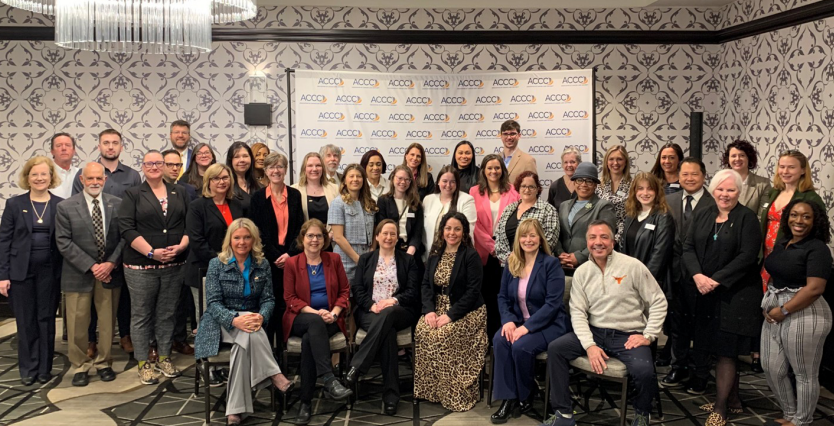
On Wednesday, March 5, more than 60 providers participated in ACCC Capitol Hill Day, a longstanding tradition where ACCC members meet with members of Congress and their staff to inform them of priority issues affecting access to and delivery of quality cancer care. ACCC Capitol Hill Day allows members to advocate for legislative and policy changes to support their cancer care community and the patients they serve. In 2025, ACCC is concentrating its advocacy efforts on 5 issues that were identified by its membership as integral to cancer care providers and the patients they serve: prior authorization, oncology drug and medical supply shortages, patient navigation, financial toxicity, and the Inflation Reduction Act.

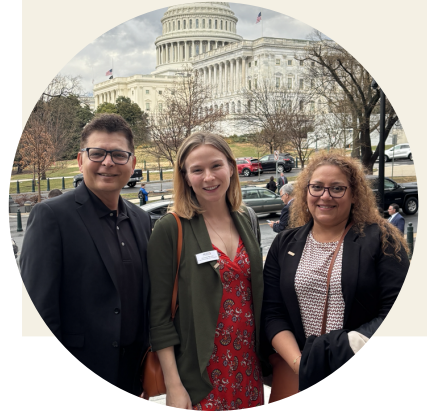
(Left to right: Sucharu (Chris) Prakash, MD; Cassandra Marakov; and Patricia Serna, MHS, PA-C, CGRA.) Texas Oncology’s Dr. Prakash spoke to the value of advocating for key issues in person. “These members of Congress and their staff really listen,” he said. “They value our opinion as providers. They want to know what issues we face in our day to day practice, and they make an effort to enact changes.” Prior authorization requirements are top of mind for cancer care providers. ACCC encourages Congress to reintroduce and enact the Seniors’ Timely Access to Care Act, which will address certain prior authorization challenges, and to support the retainment of the Department of Health and Human Services (HHS) regulation issued in January 2024. This regulation requires certain plans to send prior authorization decisions within a specified timeframe, to provide a reason for denials, and to publicly report certain metrics.

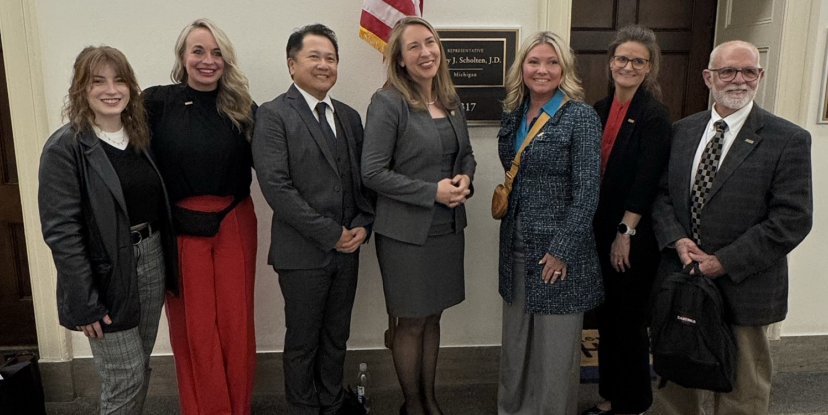
(Left to right: Rachel Radwan; Nikki Hamming RN, MSN; Kenneth Endo; Representative Hillary Scholten (D-MI); Barbara Schmidtman, PhD; Erin Barrus, MS; and Lawrence Wagman, MD.) In a meeting with Representative Scholten, Corewell Health’s Dr. Schmidtman discussed how the shortage of platinum-based therapies forced many cancer centers to ration their limited supply and only administer it to those patients receiving life-saving treatment, rather than life-sustaining. “It’s devastating to tell a patient who has 6 months to live that they can’t receive the drug that they need,” emphasized Dr. Schmidtman. “It’s impossible to quantify what that extra 6 months of life will mean to that patient, and we never want to take that choice away from them.”

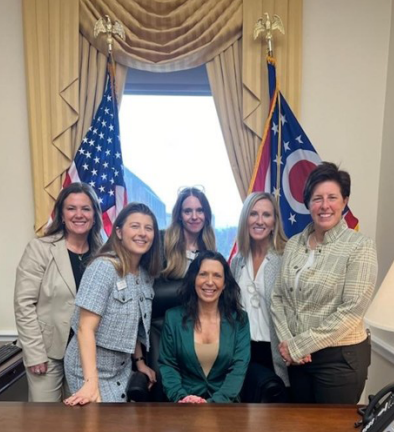
(Left to right: Anna Buehl, MBA, MSN, RN, NE-BC; Laura D’Onofrio; Emily Wire; Wendi Waugh, BS, RT(R)(T), CMD, ODS, FACCC; Jenny Scott; and Sarah Hudson-DiSalle, PharmD, RPh, FACCC.) In a meeting with ACCC members, Representative Dwight Evans (D-PA) commented on the importance of using the term financial toxicity in conversations with members of Congress to accurately depict the level of economic distress patients with cancer experience due to treatment costs. In response, members of Congress and policymakers at the federal and state levels are seeking to reduce the burden of out-of-pocket costs through enacted or proposed reforms that include changes to Medicare, Medicaid, and private-payer coverage. One example is the recent change to the Medicare Part D prescription drug program, which capped out-of-pocket expenses for covered medicines at $2000 per year. ACCC encourages Congress to continue to consider legislation to help alleviate financial toxicity for patients with cancer. ACCC also asks that Congress enact the Protecting Patient Access to Cancer and Complex Therapies Act, which seeks to mitigate the impact of any reduced Medicare reimbursement under Medicare Part B for providers and health care practices. This bill would help ensure that multidisciplinary care teams can continue to administer therapies covered by Medicare Part B and provide patients with the highest level of care.
Highlights from the ACCC 51st Annual Meeting & Cancer Center Business Summit

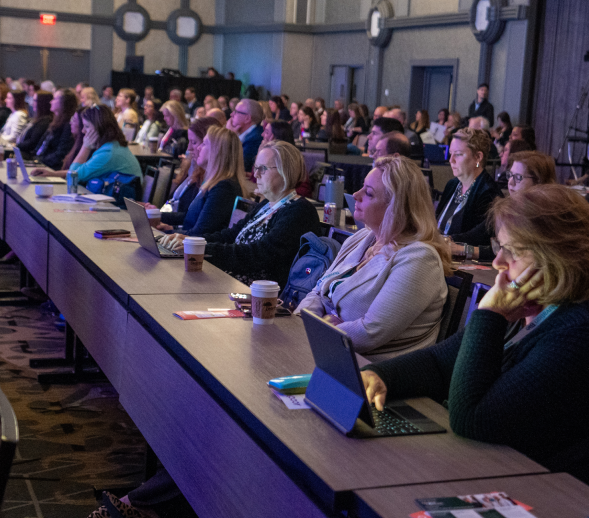
More than 400 attendees gathered in the nation’s Capital for the 51st Annual Meeting & Cancer Center Business Summit (#AMCCBS) March 5-7, 2025. Following ACCC Capitol Hill Day, Nick Webb, Health Care Futurist and author of “Chaotic Change: Embracing Chaos to Drive Innovation and Growth,” delivered the opening keynote. During his talk on The Future of Cancer Care Delivery: 2025 and Beyond, Webb focused on 3 transformative trends in oncology: hyper consumerism, integration of advanced technologies, and human experience innovation.


Webb told attendees that artificial intelligence (AI) is a game-changer for health care, with its true potential in what he calls collaborative intelligence: the fusion of human and machine intelligence. “When you think about artificial intelligence; when you combine it with real intelligence, you then get collaborative intelligence, or cooperative intelligence,” said Webb. “That’s where the magic happens.” By pairing human expertise with AI’s processing power, providers can make more informed decisions, speed up processes, and ultimately improve patient outcomes.

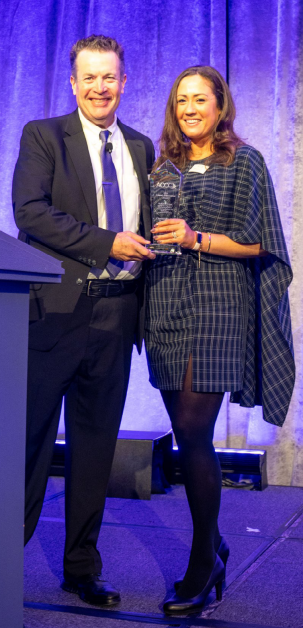
At the March 5 ACCC Awards Ceremony, Christian G. Downs, JD, MHA, (left) was honored with the 2025 ACCC Annual Achievement Award for more than 20 years of services as ACCC executive director (2003-2024). Under his leadership, ACCC launched the first Patient Assistance and Reimbursement Guide, the Financial Advocacy Network, the ACCC Innovator Award Program, and the ACCCBuzz blog and CANCER BUZZ podcast. Down’s commitment to working towards the goal of ensuring equitable access to care for all patients with cancer has shaped ACCC and its staff for years to come. “All I ask as we go forward is that we not only accept new players onto the team, but go out and find those people who should be around the table and invite them,” said Downs. “That’s what’s going to make us stronger in the long run.” (Also pictured: ACCC executive director Meagan O’Neill, MS.)

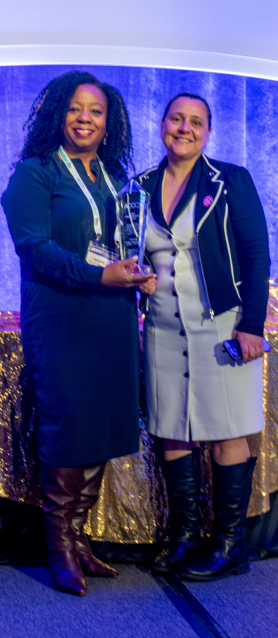
The 2025 ACCC Clinical Research Award was awarded to Mandi Pratt-Chapman, PhD, associate center director for community outreach and engagement, GW Cancer Center, (right) for her research in patient navigation and health equity— particularly for intersectional LGBTQIA+ populations. As she accepted her award, Dr. Pratt-Chapman emphasized the importance of practical application: “We’ve always focused on application: How do we make what we learn available and usable for practices and for patients?” Dr. Pratt-Chapman also underscored the importance of advocacy, urging, “Silence isn’t neutral. It doesn’t mean that you have to be loud or put yourself at risk, but that you’re standing up for the people around you and protecting them.” (Also pictured: ACCC president Nadine Barrett, PhD, MA, MS, FACCC.)

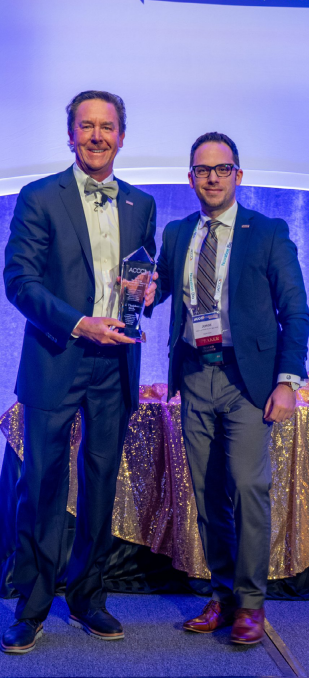
The David King Community Clinical Scientist Award was presented to J. Thaddeus Beck, MD, FACP, of Highlands Oncology. By establishing a clinical trials program in Arkansas, Dr. Beck has elevated the quality of care of these patients and increased access to clinical trials research for the region. For other organizations looking to develop a successful community-based research program, Dr. Beck recommended appointing an invested physician leader. By having great partners and providing dedicated time for that staff member, there will be a greater chance of successful management and quality care. Dr. Beck concluded, “I am humbled and honored to receive this award from ACCC.” (Also pictured: ACCC secretary Jorge J. Garcia, PharmD, MS, MHA, MBA, FACHE, FACCC.)

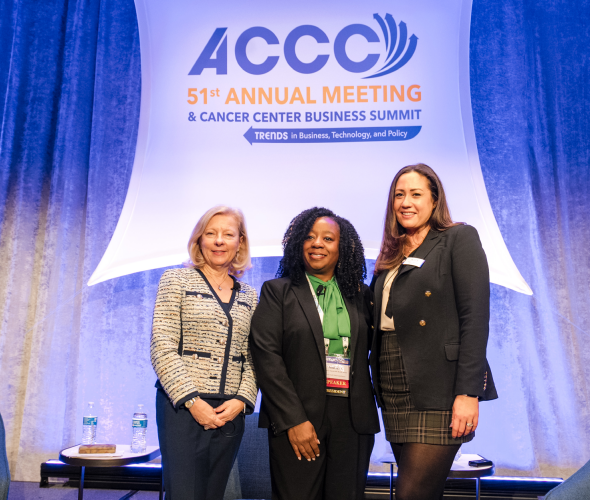
AMCCBS Day 2 opened with an empowering Q&A with ACCC president Nadine J. Barrett, PhD, MA, MS, FACCC, (center) and American Society of Clinical Oncology (ASCO) president Robin Zon, MD, FASCO, FACP, (left) moderated by ACCC executive director Meagan O’Neill, MS (right). When asked about the future of oncology, Dr. Barrett emphasized the importance of clinical research to patient outcomes. “Standard of care can only come about through research,” she stated. “That’s how they become evidence-based practices. People live longer because of what we learned from research and clinical trials. People can live to see their children graduate and get married.” Dr. Zon agreed, adding that telemedicine and hub and spoke models are essential care models that health policies must continue to support.

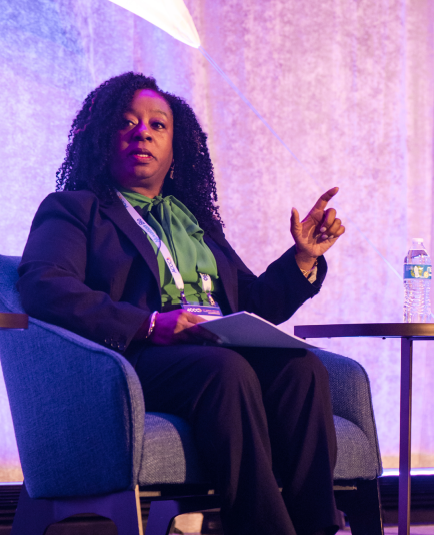
On the topic of balancing leadership roles among clinical practice, research, and administration, Dr. Barrett emphasized the importance of surrounding oneself with the right people. “I seek out those with greater expertise than my own and trust them to lead in those spaces,” she said. “I think to myself, what is my team missing, and how can we make room at the table for those voices?”

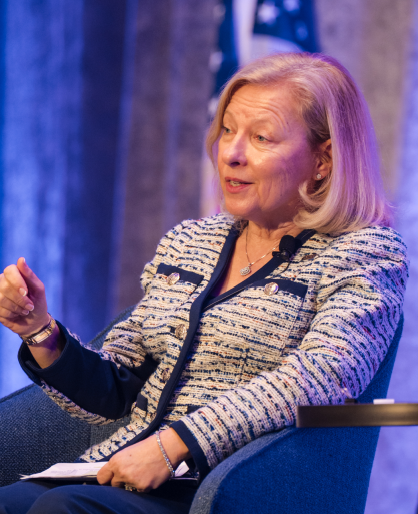
As the first person in her family to attend college, Dr. Zon too expressed deep gratitude for the support of her female mentor early in her career. “When I was being raised, women didn’t go into the sciences. In the 60s and 70s, television shows portrayed married women that didn’t work,” she said. “In the midst of that cultural norm, my mentor told me, ‘Don’t ever let anyone tell you that you can’t be a professional woman, a wife, and a mother, and be good at all of them.’”


Much of AMCCBS Day 2 was dedicated to 8 deep dive workshops: interactive expert-led conversations that aimed to address the most significant challenges in oncology today and invited attendees to brainstorm practical solutions. Topics included Adoption of AI and BI Solutions, Growth Opportunities in Oncology, Strategic Oncology Partnerships and Affiliations, Expanding Patient Access to Care with Technology Enablement, and Payer Challenges and Solutions. Insights from these workshops will be compiled into the ACCC 2025 Trending Now in Cancer Care report. Be on the lookout for this comprehensive report in the next 2 Oncology Issues.

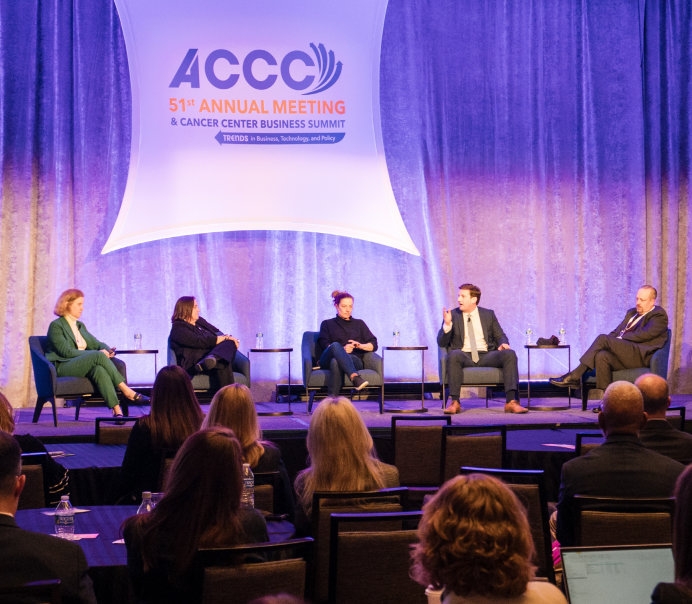
AMCCBS Day 2 concluded with a health care policy update in the form of a panel discussion led by seasoned policy experts. Speaking to the increasingly important issue of prior authorization and the treatment delays it frequently causes, panelists expressed their optimism for the reintroduction of the Improving Seniors’ Timely Access to Care Act. The panel expressed disappointment that the bill was not able to get over the finish line at the end of last year, and encouraged providers to urge congressional representatives to stay strong and preserve the intent of the bill. Financial toxicity was also raised during the panel discussion, and with it, the reality that Medicaid cuts mean cutting the program that makes health care affordable for the most vulnerable Americans. Panelists affirmed that the affordability conversation is incredibly important to members on both sides.

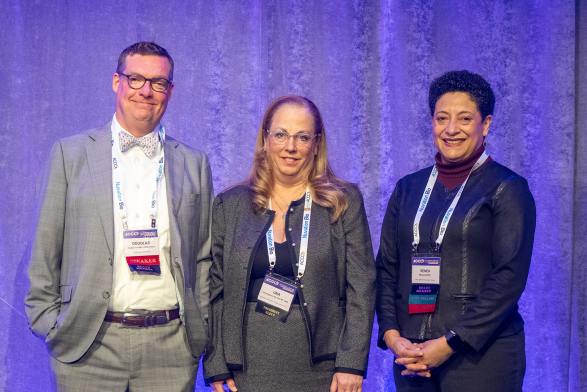
AMCCBS Day 3 kicked off with the ACCC House of Delegates meeting where ACCC elected Una Hopkins, RN, FNP-BC, DNP, director of research, Montefiore Einstein Cancer Care Center (center), as 2025-2026 ACCC president; Douglas Flora, MD, LSSBB, FACCC (left), executive medical director oncology services, St. Elizabeth Healthcare, editor-in-chief, AI in Precision Oncology as ACCC incoming president; and Renea Austin Duffin, MPA, FACCC, vice president Mary Bird Perkins Cancer Center, as ACCC treasurer.

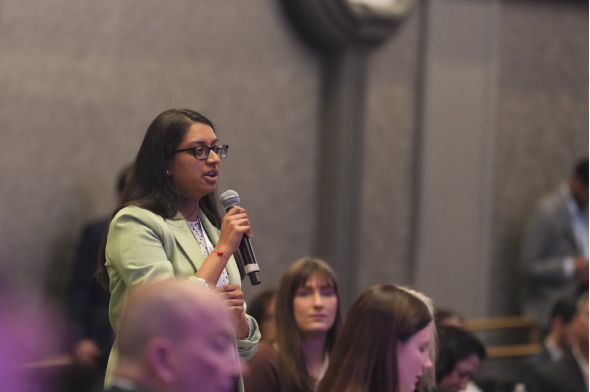
AMCCBS 2025 ended on a strong note with sessions on Evidence-Based Decision-Making in Health Care Management and Leadership, which highlighted the importance of leaders asking the right questions, finding the best available evidence, and using these insights to make managerial decisions in the constantly evolving health care landscape; a panel discussion on growth strategies and marketplace differentiators; and a presentation about the opportunity to pair oncology with women’s health and focus on the intersection of women’s health and oncology services through joint clinical management.
Spring 2025 Oncology Reimbursement Meetings
ACCC’s regional Oncology Reimbursement Meetings are a valuable opportunity for members to navigate annual changes in oncology reimbursement and regulations, learn about tools to improve financial operations and revenue management in their programs, and connect with peers to accelerate their knowledge. Free to all ACCC members, these 1-day meetings help attendees stay on the forefront of oncology business and reimbursement with the latest information in a rapidly changing landscape. This year’s agenda includes sessions about finding trends in prior authorization denials, coordination of care for bispecific antibodies, negotiating with the C-suite to make the case for multidisciplinary care, and more.
Hold these dates:
May 7: Stamford, Connecticut Hilton Stamford Hotel
May 21: New Orleans, Louisiana Astor Crowne Plaza New Orleans
ACCC Welcomes its Newest Members:
- Glencoe Regional Health
Glencoe, Minnesota
Delegate Rep: Wendy Broderson
Website: grhsonline.org - Parkview Packnett Family Cancer Institute
Fort Wayne, Indiana
Delegate Rep: Alan Yahanda
Website: parkview.com/locations/parkview-packnett-family-cancer-institute - Providence Cancer Institute - South Division
Irvine, California
Delegate Rep: Brad Bott
Website: providence.org/locations/socal/cancer-orange-county - Providence Queen of the Valley Medical Center Cancer Program
Napa, California
Delegate Rep: Jill Vohs
Website: providence.org/locations/norcal/queen-of-the-valley - Providence Santa Rosa Memorial Hospital
Santa Rosa, California
Delegate Rep: Michelle Heron
Website: providence.org/locations/norcal/santa-rosa-memorial-hospital - The Queen’s Medical Center, Queen’s Cancer Services
Honolulu, Hawaii
Delegate Rep: Jennifer Kimbell
Website: queens.org/services/cancer-care/locations/hospitals/qmc - Tunnell & South Coastal Cancer Centers
Lewes, Delaware
Delegate Rep: Jeanne-Marie Grosser
Website: beebehealthcare.org/locations/tunnell-cancer-centersouth-coastal-cancer-center















